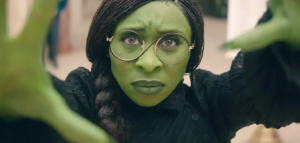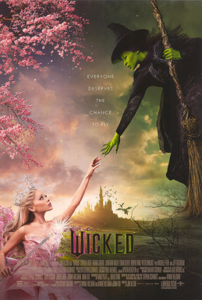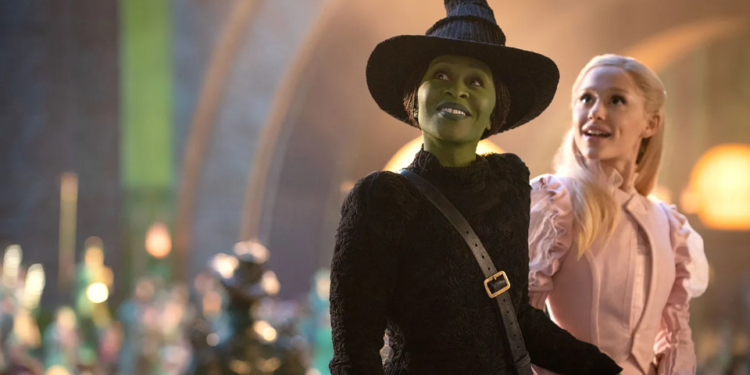“So much happened before Dorothy dropped in” is one of the cheeky, knowing taglines of the stage adaptation of Gregory Maguire’s novel, Wicked. That could also be applied to the film adaptation–so much happened in the writing process and pre-production before we finally got to see Elphaba take flight and defy gravity. Joining the original musical’s book writer, Winnie Holzman, Dana Fox dove in to help expand and deepen the emotional arcs of its two lead characters while satisfying diehard fans and Wicked newcomers alike. A musical has not cracked Best Adapted Screenplay since 2002’s Chicago, and the Fox and Holzman’s work should not go unnoticed.
I was in a theater program in college when Wicked hit Broadway, and I could not imagine the fervor it would have caused if social media was around then. It was being performed in vocal juries and showcases everywhere, and its popularity knew no bounds. Imagine if TikTok or Instagram existed in 2003–Wicked would be even bigger than it is now. It’s not just about loving a musical and its songs, though. Fox knew that audiences (repeated audiences, to be exact) felt a connection with the show’s themes of friendship and sisterly love. The responsibility to the audience was paramount, and Fox was aware of the pressure to get it right.
“All the pressure,” Fox says with a knowing laugh. “I was brought in by John M. Chu, and so the fact that Winnie [Holzman] and Steven [Schwartz] welcomed me into this twenty-year legacy was incredible. It was their baby, and it happens to be one of the most popular musicals of all time. The fans are bonkers into it–they don’t just love it–so I felt a really deep sense of responsibility. Part of it didn’t feel like pressure, because we were lucky that people feel this way about something. First and foremost, we have to make the fans of the musical happy, and we have to make them so happy that this finally got made into a movie. Why make a movie if people love the show so much? We felt we had to answer that question from the beginning. Everyone has a different favorite moment from the musical, so we needed to nurture those baby eggs to make sure those felt protected.”

Any time a new musical adaptation comes around, everyone is worried about what is going to be cut in order to slice down the runtime. When I saw Wicked for the first time in the theater, I turned to my other theater-loving friends and remarked how nothing was cut out, but, at the same time, nothing felt padded or stretched out. Fox points to how the experience of seeing something in a movie is not meant to be the same as when you watch a live production. They are completely different experiences, and the team wanted to honor and acknowledge that.
“A movie is not a play, and the feeling of watching a movie is different than watching something on stage,” she says. “When I grew up, I couldn’t afford to sit close enough to see what anyone’s face was doing. I was as far back as you can be, so knowing that now we could be right in these characters’ faces and watching their emotions [during] these scenes was so exhilarating. We could do somehing that we couldn’t do with a stage production, which is close-ups and really digging into those emotions up close. Then it became a question of how do we expand on the story, deepen the story, deepen what you know about it all while making other people feel like we didn’t take their favorite thing in the world and ruin it. Stephen, Winnie, Jon and I, during the pandemic, talked on Zoom for 158 hours before we even started writing. It was the most amazing thing of all time.”
That conversation continues as we talk about specific lines in the musical and how they support the narrative, the arc of the songs themselves and the arc of the film as a whole. It’s not unlike how you break down a scene as an actor and discuss how the beats of a scene affect the relationhip to other characters and the course of the story.
“We always were aware that the length was going to be tricky,” Fox says. “We looked at at all the songs that we would have to cut, and we couldn’t do it. You can’t cut Dr. Dillamond’s song, because he’s the mascot of the whole movie. Since we weren’t cutting any of the songs, it creates a certain number of minutes that you can’t adjust. We were interrogating the lyrics of each of the songs. Whenever you get chills on your body from a line, we thought about why you got that reaction. In “Defying Gravity” when Elphaba sings, ‘Nobody in all of Oz/No wizard that there is or was/Is ever going to bring me down,’ we examined if we have seen enough moments that bolster that particular line. Do we feel like The Wizard made her feel like she could be something other than what she could be? Do we have enough moments where you see Elphaba expressing what she wants at the beginning so that when she’s hurt at the end, when she realizes that it was all a lie, it feels like a total betrayal?
Madame Morrible’s turn feels deeper at the end of the film, because we bolstered all these moments at the beginning where Morrible was really like a mother figure to [Elphaba]. In the musical, you kind of know that Morrible shouldn’t be trusted. Since we had more time, we wanted to create a moment where Elphaba does her magic and Morrible covers for her. It builds the relationship immediately and bonds them so it makes the betrayal hurt even deeper since she felt like such an unexpected mother figure for Elphaba.”
The lyric change that knocked my (black-and-white striped) socks off was at the very end of the film where the Emerald City soldiers don’t command to capture Elphaba but to kill her. That change is credited to Schwartz, but it reinforces how they were careful to infuse every choice with intent.
“Every single word of the script was so carefully thought out, so we never made a single choice that wasn’t something that we talked about for a considerable amount of time,” she says. “For example, we were very careful when we used the word wicked. Were we going to use it too early? Why are we using it in a specific place? When Morrible does it in the middle of “Defying Gravity” in her announcement, the word has power that she has wants it to have, especially since we haven’t heard it used very much at all by that point.”
One of the most refreshing aspects of Wicked‘s presence in this awards season is how genuine everyone feels about creating something with respect and love. It’s theater kid energy in the purest form, whether it’s Ariana Grande and Cynthia Erivo taking a lie detector test or John M. Chu expounding on his love of cinema at the Golden Globes. The film adaptation of Wicked shows how a movie musical should always be treated.
“I grew up in a small town where it’s a miracle that I became a person who makes movies,” Fox says. “What reached out to me in my small town and made me want to be creative was musicals and movies. That’s how I discovered that I wanted to do this. The fact that this whole group of people now is watching all of these people get inspired enough to make their own art, whether it’s memes or videos or TikToks, we’re all so excited, because we see ourselve in that. Maybe this movie we made is going to be the thing that makes somebody want to be in the movies and want to tells stories and give permission for someone to dream big. How much people to want to express the joy they feel when watching this movie is almost overwhelming. I’ve gotten four pages emails from people, and that’s never happened to me before. This movie is really connecting, and John is that guy that you see in interviews and on television talking about the film. He’s the kindest and most compassionate person on the planet Earth.”

A lot of audience members were commenting on how Elphaba’s defiance feels more relevant than they would like, especially after this last Presidential election. Would Wicked feel the same if Kamala Harris triumphed in November? Fox points out how frauds and imposters keep popping up in history–no matter how much we want them to go away. It is the job of writers, actors, and creators to comment on that atmosphere.
“When L. Frank Baum wrote The Wizard of Oz, there were certain political things going on, and when Gregory Maguire wrote Wicked, there were things happening in the world that were worth commenting on,” she says. “The same goes for when Winnie and Stephen were working on the stage adaptation. We had no idea what was going to happen politically two years later when out movie came out. We can’t feel the future. Unfortunately, charlatans keep showing up, and people keep trying to get power. People keep trying to use anyone who has less power to vilify them like the animals in our story. Unfortunately, it continues to be relevant regardless of where you are in time, because there’s always someone who is going to use hate instead of love to try and scare people and try to take advantage of others.”
That teaching of hate is not just political but personal. Elphaba has been rejected her entire life–quite literally from the moment she was born. Her father sees her and rejects her, planting a seed of doubt, uncertainty, and loathing that no child should feel. Extending love instead of that detestation is one of the core values of Wicked and why audiences are so amped for Wicked: For Good.
“People have to be taught how to hate,” Fox says plainly. “So now you’re looking at this beautiful child who’s this little toddler, Elphaba, and saying to yourself, “She’s evil. She’s wicked. She’s bad.” No, she’s a child. You think about how she was treated by her own father and you think about how the soldiers sing at the end. They want to kill her–that’s so devastating to me. That’s how people like The Wizard thinks he can control her. They have to kill her. And just wait for part two. Buckle your fucking seatbelt.”
Wicked is in theaters now. You can rent and purchase the film on digital platforms.









